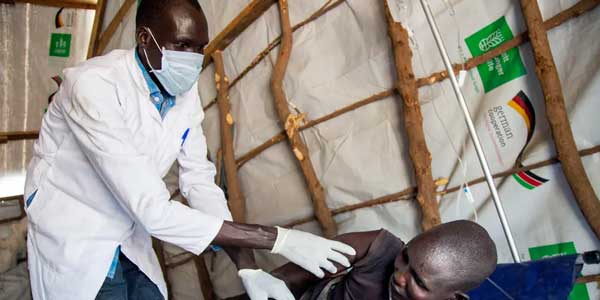In eastern Sudan, amid the ongoing deadly conflict between the nation's military and a rival paramilitary force, a dire situation has emerged.
Reports from the UN health agency reveal the outbreak of both cholera and dengue fever among the thousands of people seeking shelter in densely packed camps.
The World Health Organization (WHO) has disclosed that 162 individuals with suspected cholera have been admitted to hospitals in Qadarif province and other regions along Sudan's border with Ethiopia. Out of these cases, 80 have been confirmed, and tragically, 10 people have succumbed to cholera, a bacterial infection often linked to contaminated food and water sources.
Sudan descended into chaos in mid-April when long-standing tensions between the military and a powerful paramilitary group erupted into full-scale conflict in various parts of the nation, including the capital, Khartoum.
Responding to this dire health crisis, the humanitarian organisation Doctors Without Borders has established two cholera treatment centres and deployed two mobile teams in Qadarif. Additionally, WHO and the UN refugee agency have renovated the isolation centre for cholera at the Qadarif Teaching Hospital, the province's primary healthcare facility.
Across the border in Ethiopia, a cholera outbreak that began in August 2022 has afflicted over 20,000 individuals, resulting in more than 270 fatalities, according to WHO. This outbreak has impacted seven regions, including areas along the Sudanese border.
WHO has also reported over 500 suspected cases of dengue fever in various urban centres in Qadarif, Sudan. Dengue fever is caused by the dengue virus, which is transmitted to humans through the bites of infected mosquitoes. It is important to note that the reported number of cases likely represents only a fraction of the actual total, as many patients rely on home remedies and avoid seeking hospital care.The Sudanese doctors' union has grimly reported "hundreds" of dengue-related deaths in the eastern part of the country, labelling the outbreak a "health crisis."
While a specific timeframe for these deaths was not provided, it was noted that most hospitals in Qadarif have been overwhelmed by the influx of patients.
In addition to these health crises, Sudan has faced severe challenges due to heavy rains and flooding, resulting in the destruction or damage of at least 13,000 houses in seven provinces since July. The UN Office for the Coordination of Humanitarian Affairs reports that more than 72,000 people have been affected by these natural disasters.
Notably, the World Health Organisation recently emphasised that, in addition to the enduring drivers of cholera, such as poverty and conflict, the increasing frequency and severity of storms and flooding due to climate change are contributing to outbreaks worldwide.
The ongoing conflict in Sudan has transformed urban areas, including Khartoum, into battlefields, leading to the destruction of civilian infrastructure and further straining the already beleaguered healthcare system. Many hospitals and medical facilities have been forced to close their doors.
As a result of the conflict, over 5,000 people have lost their lives, with more than 12,000 others suffering injuries, according to the United Nations. Regrettably, the actual figures are likely even higher. In a harrowing statistic, the UN refugee agency recently reported that over the past five months, more than 1,200 children under the age of 5 have perished in nine camps in Sudan due to a deadly combination of measles and malnutrition.
The humanitarian crisis has led to the displacement of more than 5.2 million people, including over 1 million who have sought refuge in neighbouring countries. Approximately half of Sudan's population, amounting to around 25 million individuals, is in dire need of humanitarian assistance, with roughly 6.3 million on the brink of famine, according to UN humanitarian officials.



























